Dental implants have become a hallmark of modern dentistry, providing a permanent and aesthetically pleasing solution for individuals facing the challenges of missing teeth. These implants are designed to act as natural tooth roots, offering enhanced functionality that allows patients to chew, speak, and smile with renewed confidence. However, alongside their numerous benefits comes the essential responsibility of maintaining and caring for them. Just like natural teeth, dental implants require diligent attention and care to ensure their longevity and optimal performance. This comprehensive guide will delve into how to care for dental implants, encompassing everything from initial post-surgery care to long-term maintenance strategies.
Initial care after implant surgery
The period immediately following dental implant surgery is critical for successful recovery. Understanding how to navigate this phase can significantly impact the integration of the implant into the jawbone—a process known as osseointegration. By following specific guidelines and recommendations, patients can minimize complications and set the stage for a healthy, functional implant.
Immediate post-surgery guidelines
After undergoing dental implant surgery, it’s common to experience some degree of discomfort, swelling, and bleeding. To help manage these symptoms and promote healing, follow your dentist’s instructions carefully. Here are several immediate post-surgery guidelines to consider:
- Bite on a gauze pad: After your procedure, your dentist will place a gauze pad over the surgical site. Gently biting down on this gauze will help control any bleeding and absorb excess blood. Make sure to change it as needed, keeping an eye on how much bleeding occurs.
- Apply ice packs: Ice packs can be beneficial in reducing swelling during the first 48 hours post-surgery. Wrap ice packs in a cloth and apply them to your face for intervals of 15 minutes to soothe inflammation and lessen discomfort.
- Elevate your head: Keeping your head elevated while resting can also help decrease swelling. Using extra pillows at night may aid in maintaining elevation during sleep.
- Avoid strenuous activities: It’s important to refrain from heavy lifting or vigorous physical activities for several days following the surgery. Such actions can increase blood flow to the area, potentially exacerbating swelling and bleeding.
- Follow prescribed medication regimen: Your dentist may prescribe antibiotics or pain relievers to combat potential infections and manage discomfort. Ensure you understand the dosage and schedule for taking these medications.
- Maintain a soft diet: In the initial days post-surgery, stick to soft foods that do not require extensive chewing. Options such as applesauce, yogurt, smoothies, scrambled eggs, and mashed potatoes are gentle on the surgical site and easy to consume.
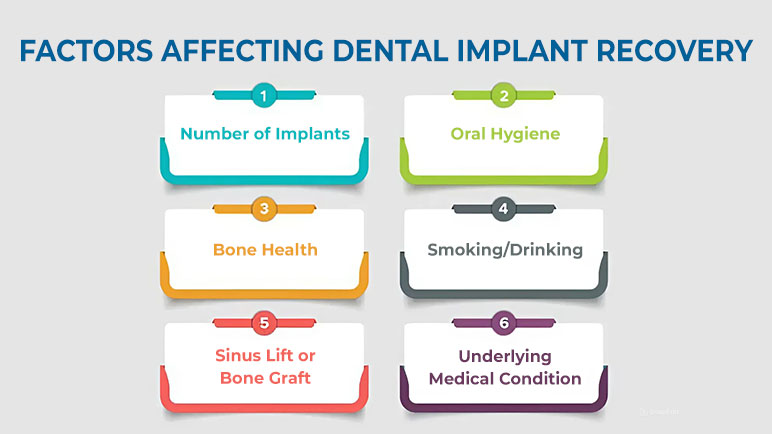
Managing discomfort and pain
Everyone has a different tolerance for pain, and the level of discomfort experienced after dental implant surgery can vary widely among patients. Most individuals find that mild discomfort can be managed effectively with over-the-counter pain relievers, such as ibuprofen or acetaminophen.
In cases where pain persists or escalates, it’s crucial to communicate with your dentist. They can provide stronger pain management options or assess for any complications that may be causing increased discomfort. While some swelling is expected, significant pain accompanied by fever, excessive bleeding, or other unusual symptoms should prompt an immediate call to your dental professional.
Importance of following your dentist’s instructions
Following your dentist’s guidance during the recovery phase cannot be overstated. Adherence to prescribed care protocols significantly influences the healing process and overall success of dental implants. Ignoring your dentist’s recommendations or attempting to return to normal routines too quickly can lead to complications such as infection, prolonged healing times, or even implant failure.
For optimal results, maintain open communication with your dentist, seeking clarification on any points you may not fully understand. The cooperation between patient and provider during this delicate stage lays the groundwork for long-lasting and effective dental implants.
Daily oral hygiene practices for dental implants
Once you’ve navigated the initial stages of recovery, establishing a robust oral hygiene routine becomes paramount for the longevity of your dental implants. Proper care directly affects the health of the surrounding tissues and helps ward off infections that could compromise your implant.
Brushing techniques for implants
Brushing your dental implants requires special attention, just as you would with your natural teeth. A few key tips can enhance your brushing technique and ensure thorough cleaning:
- Use a soft-bristled toothbrush: Opt for a soft-bristled toothbrush when cleaning around your implants, as hard bristles can irritate and damage the surrounding gum tissues. Gentle, circular motions are the best way to clean without causing harm.
- Consider using an electric toothbrush: Electric toothbrushes, particularly those equipped with oscillating brush heads, can effectively remove plaque and debris around dental implants. Their consistent motion can also make brushing easier for patients with limited hand dexterity.
- Angle the brush correctly: Position your toothbrush at a 45-degree angle toward the gumline when brushing near the implants. This ensures effective cleaning along the gum margins and minimizes plaque accumulation.
- Brush thoroughly but gently: While being gentle is essential to prevent injury, it’s equally important to ensure that all surfaces of your implants and neighboring teeth are cleaned well. Aim for at least two minutes of brushing twice daily for the best results.
Flossing around dental implants
Flossing is an integral component of oral hygiene and should not be overlooked in your dental implant care routine. Flossing helps eliminate food particles and plaque that may accumulate between your natural teeth and implants.
- Choose the right tools: Depending on the spacing between your implants and natural teeth, you might use traditional dental floss, specialized interdental brushes, or implant-specific floss threaders. These tools allow you to maneuver easily around your implants.
- Be gentle during flossing: When working the floss around your implants, avoid snapping or forcing it against the gum tissue, as this can lead to irritation or even injury. Instead, gently guide the floss between the teeth and along the base of the implant, ensuring a thorough clean without trauma.
- Clean thoroughly: Use a careful back-and-forth motion to remove any trapped food and debris. This attention to detail will help prevent gum inflammation and maintain optimal implant hygiene.
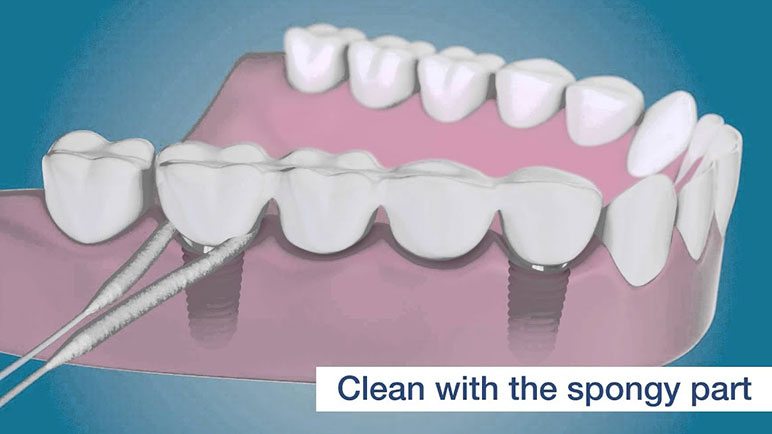
Recommended oral hygiene products
Your dentist can provide recommendations for products tailored specifically to your oral hygiene needs, especially if you have dental implants. Consider incorporating the following items into your care regimen:
- Antibacterial mouthwash: An antibacterial mouthwash can help control bacteria and minimize the risk of infection around your implants. Look for an alcohol-free option to avoid drying out the mouth, which can exacerbate bacteria growth.
- Specialized interdental brushes: Interdental brushes are ideal for cleaning tight spaces between your natural teeth and implants. These brushes come in various sizes and can effectively remove plaque that regular brushing may miss.
- Implant-specific floss threaders: Some dental implants feature difficult-to-reach areas that require specialized flossing tools. Your dentist can recommend the best threaders for your situation.
Regular dental visits
Regular dental visits are fundamental to maintaining the health of your dental implants and preventing potential issues. Establishing a partnership with your dental professional will contribute significantly to the long-term success of your implants.
Importance of follow-up appointments
After your dental implant surgery, your dentist will schedule a series of follow-up appointments to monitor your recovery and the integration of the implant. Attending these appointments is essential for several reasons:
- Monitoring healing progress: Your dentist will evaluate how well your gums and bone are healing and whether the implant is integrating properly. Catching any problems early can mitigate more severe complications later.
- Addressing concerns: If you experience any discomfort, changes in your bite, or other questions about your implants, your follow-up appointment is the perfect time to bring them up. Open communication with your dentist fosters a collaborative approach to your oral health.
What to expect during check-ups
During your regular check-ups, your dentist will conduct several assessments to ensure the health of your dental implants:
- Examine the implant site: Visual examinations of the implant site will allow your dentist to assess the status of your gums and surrounding tissues for signs of healing or inflammation.
- Check for signs of infection: Your dentist will look for any red flags indicating potential infection, such as swelling, pain, or discharge. Prompt identification of these issues is vital for protecting your implant.
- Assess the implant’s stability: Evaluation of the implant’s stability during your check-up will help determine the success of the osseointegration process. Ensuring that the implant remains secure is crucial for its long-term functionality.
- Professional cleaning for implants: In addition to routine checks, your dentist or hygienist will perform professional cleanings specifically designed for implants. This deep cleaning will remove plaque and tartar that may have built up despite regular home care efforts.
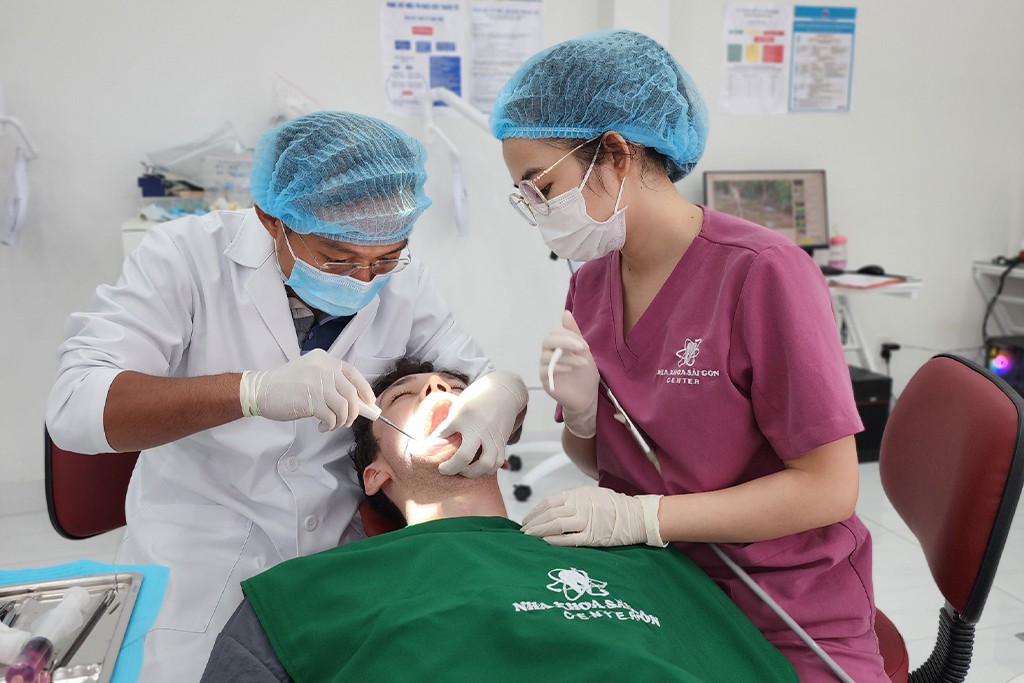
Professional cleaning for implants
Professional dental cleaning is an integral aspect of maintaining dental implant health. Because plaque and tartar can accumulate around the implant site, regular cleanings conducted by a dental professional are essential for preventing gum disease and preserving the integrity of the implant.
- Specialized instruments: Dentists and hygienists utilize specialized instruments engineered for cleaning around dental implants. These tools effectively remove deposits while minimizing the risk of damaging the implant or surrounding gum tissues.
- Frequency of cleanings: Depending on individual needs, most dental professionals recommend scheduling professional cleanings every six months. However, patients with a history of gum disease or other factors may benefit from more frequent visits.
Diet and nutrition for implant care
Your dietary choices can influence the health and longevity of your dental implants. Certain foods promote healing and good oral health, while others can pose risks to your implant’s success.
Foods to eat after surgery
In the days immediately following dental implant surgery, adhering to a soft diet can help alleviate stress on the surgical site. Choose foods that are nutritious yet gentle on the mouth:
- Soups: Broth-based soups serve as both a nourishing and non-irritating meal option post-surgery. They are warm, soothing, and can deliver essential nutrients for healing.
- Yogurt: Rich in protein and probiotics, yogurt is an excellent choice for fostering recovery. Probiotics can help maintain a healthy balance of bacteria in your mouth, which is crucial for preventing infections.
- Smoothies: Packed with vitamins and minerals, smoothies are an easy way to ensure adequate nutrition while maintaining a soft texture. Blend fruits, vegetables, and proteins for a balanced meal.
- Scrambled eggs: Eggs are soft, high in protein, and easily digestible. They provide essential nutrients necessary for overall health and recovery.
- Mashed potatoes: Creamy and easy to chew, mashed potatoes are a comforting staple that can be enjoyed while recovering from surgery.
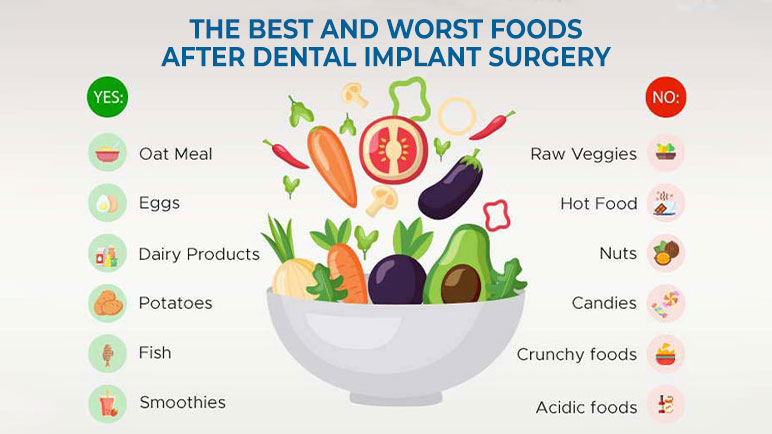
Foods to avoid with dental implants
It’s essential to steer clear of certain foods that could jeopardize the integrity of your implants or lead to oral health issues:
- Hard, crunchy foods: Foods such as nuts, hard candy, and popcorn can pose a risk of damaging the implant or its restoration. Avoid anything that requires considerable force to chew.
- Chewy foods: Tough meats and chewy candies can strain the implant, increasing the likelihood of complications. Enjoy these foods only once your healing is complete.
- Sticky foods: Sticky items like gummy bears or dried fruit can trap bacteria and contribute to plaque buildup around the implant. They should be consumed cautiously, if at all.
- Sugary drinks and foods: Excessive sugar intake can lead to cavities and gum disease, which poses threats to your implant’s health. Moderation is key when indulging in treats.
Nutritional supplements that support oral health
A well-rounded diet is crucial for supporting your dental implant health, but certain supplements can also bolster your oral health efforts:
- Vitamin D: This vitamin is instrumental in calcium absorption, which is essential for strong bones and jawbone health. Ensuring sufficient levels of Vitamin D aids in the healing process after surgery.
- Calcium: As the primary building block of teeth and bones, calcium is vital for maintaining the structural integrity of your jaw. Incorporating calcium-rich foods or supplements can support both your teeth and implants.
- Vitamin C: Known for its immune-boosting properties, Vitamin C is also essential for supporting gum health. Including this antioxidant in your diet can help reduce inflammation and promote healing.
- Probiotics: Probiotics can facilitate a healthy balance of oral bacteria, contributing to reduced risks of gum disease and enhancing overall oral health. They can be sourced through supplements or probiotic-rich foods.
Lifestyle factors affecting dental implants
Several lifestyle choices can profoundly affect the health and longevity of your dental implants. Being aware of these factors and making informed decisions can optimize the success of your implants.
The impact of smoking on implants
The detrimental effects of smoking on oral health are well-documented, and dental implants are no exception. Smoking significantly increases the risk of implant failure due to several factors:
- Reduced blood flow: Nicotine restricts blood flow to the implant site, impairing the body’s ability to heal and hindering the osseointegration process, which is critical for implant success.
- Increased susceptibility to infections: Smokers have a higher likelihood of developing gum disease and infections, which can jeopardize the health of both natural teeth and dental implants.
Given the risks associated with smoking, individuals considering dental implants should seriously evaluate their habits. Quitting smoking not only enhances oral health but also improves overall well-being.
Alcohol consumption and its effects
While moderate alcohol consumption may not be directly harmful to dental implants, excessive drinking can introduce several concerns for oral health:
- Mouth dryness: Alcohol can dehydrate the soft tissues in the mouth, leading to irritation and increased susceptibility to bacterial growth.
- Impaired healing: Heavy drinking can interfere with the body’s natural healing processes, slowing down recovery and increasing the chances of complications post-surgery.
To optimize your implant success, limit alcohol consumption, especially in the critical recovery period following surgery.
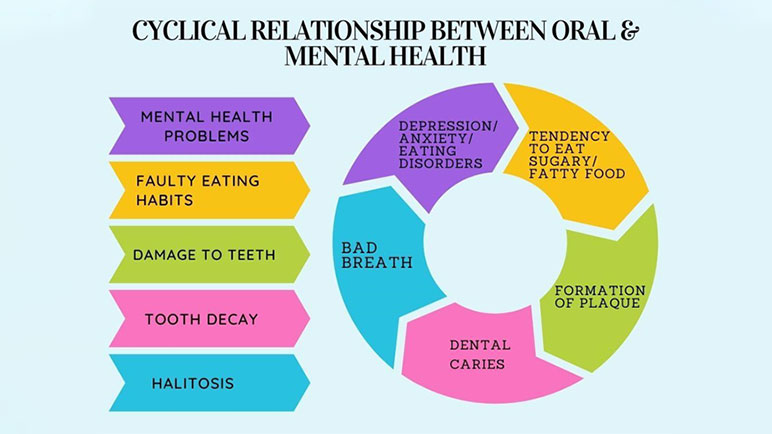
Stress management for better oral health
Managing stress effectively contributes positively to overall oral health and impacts the longevity of your dental implants. Chronic stress can result in various oral health problems, including:
- Bruxism: Teeth grinding or clenching resulting from stress can put excessive pressure on dental implants, leading to micro-fractures or loosening over time.
- Neglected oral care: Elevated stress levels may lead to neglecting oral hygiene practices, increasing the risk of plaque buildup and subsequent implant complications.
Implementing stress-reduction techniques, such as mindfulness, yoga, or exercise, can create a healthier mindset and promote better oral habits. Maintaining a balanced lifestyle is key to the holistic care of your dental implants.
Long-term maintenance of dental implants
Ensuring the longevity of your dental implants goes beyond the initial postoperative care and hygiene practices. Engaging in proactive maintenance and staying vigilant about your oral health will yield the best outcomes over time.
Best practices for continued oral hygiene
To uphold the health of your dental implants and surrounding tissues in the long term, practice these best hygiene habits:
- Consistent brushing and flossing: Commit to a daily routine of brushing twice and flossing at least once per day. Consistency is crucial for preventing plaque buildup and gum disease.
- Use of specialized products: Incorporate antibacterial mouthwashes and other products recommended by your dentist to enhance your home care regimen and protect your implants.
- Be vigilant about symptoms: Pay attention to any changes in your mouth, such as sensitivity, swelling, or unusual discomfort. Early detection of potential issues can lead to timely interventions.
Tips for longevity of implants
Maximize the lifespan of your dental implants by following these practical tips:
- Prioritize regular dental visits: Schedule regular check-ups and professional cleanings with your dentist, allowing for ongoing assessment and intervention as needed.
- Maintain a balanced diet: Adopting a nutrient-rich diet supports your overall health while reinforcing the strength of your implants. Be conscious of what you eat and avoid harmful substances.
- Limit harmful habits: Reducing or eliminating smoking and excessive alcohol consumption can substantially improve your odds of maintaining healthy implants.
When to consider replacement or repair
While dental implants are designed to last for many years, there may come a time when repairs or replacements are necessary. Here are a few indications that warrant further evaluation:
- Mobility or looseness: If you notice any mobility in your implant or feel that it is loosening, consult your dentist promptly. This could indicate underlying issues that need addressing.
- Persistent pain or discomfort: Ongoing discomfort, swelling, or signs of infection around the implant should never be ignored. Seek immediate professional advice if you experience any concerning symptoms.
- Changes in appearance: Should the appearance of your implant begin to change or show visible signs of wear and tear, reach out to your dentist to discuss potential options for repair or replacement.
Conclusion
Caring for dental implants involves a multifaceted approach that encompasses immediate postoperative care, daily hygiene practices, regular dental visits, nutritional considerations, and lifestyle modifications. By understanding how to care for dental implants—from the initial healing period to long-term maintenance—you empower yourself to achieve optimal results and enjoy the benefits of a restored smile.
Implementing these care strategies will not only enhance the functionality and aesthetics of your implants but also contribute to your overall oral health. By prioritizing your dental hygiene, adhering to your dentist’s instructions, and embracing a healthy lifestyle, you can ensure that your dental implants remain a reliable solution for many years to come. Remember, a proactive approach to care is the best pathway to success in the world of dental implants.

 Google Reviews
Google Reviews Call
Call
SAIGON IMPLANT CENTER
Best dentist in Vietnam
Saigon Implant Center - Dental Clinic utilizes the latest technology for specialized treatment in the field of Single implant, full jaw implants, All on 4 implants, All on 6 implants, Zygoma implant....
SAIGON IMPLANT CENTER
Best dentist in Vietnam
Saigon Implant Center - Dental Clinic utilizes the latest technology for specialized treatment in the field of Single implant, full jaw implants, All on 4 implants, All on 6 implants, Zygoma implant....